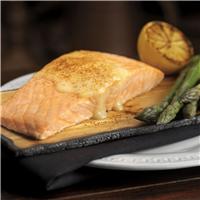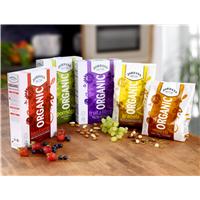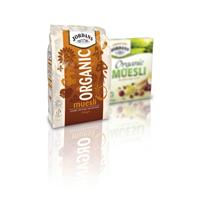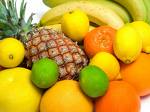
Monica Reinagel is author of The Inflammation Free Diet Plan. You can write to her at monica@inflammationfreediet.com


Monica Reinagel is author of The Inflammation Free Diet Plan. You can write to her at monica@inflammationfreediet.com

London: Britain is a nation of supplement junkies, with three quarters of us regularly adding extras to our diet to keep healthy, spending more than £350m a year on shortcut solutions to health.
New research from milk company, Cravendale exposes that over half of those Brits (59%)are investing in pills and potions with very little or no knowledge of their benefits. Even fewer people realise that milk contains crucial nutrients such as vitamins B2 [Riboflavin] and B12, protein, and phosphorus as well as contributing towards daily vitamin A, B1 [Thiamin], zinc, magnesium and potassium.
A quarter of supplement fans (27%) blame their busy lifestyles, and one in four cite pressure to get in their five a day: with no time for fruit and veg, theyre stocking up on supplements instead. One in ten men are taking pills to get gym fit; and 15% of women take supplements specifically to help prepare them for pregnancy.
Leading the trend are youngsters: 86% of under-25s take supplements on a
regular basis. This habit is being established at an increasingly young age – 44% of mums admit to adding supplements to their childrens diet on a
regular basis.
Sue Malcolm, consultant nutritionist for Cravendale milk says: Supplements do have their place, but for many of us a healthy diet should be the first choice. A simple glass of milk contains important nutrients including vitamins and minerals that help you on your way towards achieving a healthy diet, no matter what age.
A glass of Cravendale naturally contains more than 20 crucial nutrients, including a third of your recommended daily requirement for calcium for strong bones and teeth.
A glimpse of unhealthy Britain reveals:
Bad diets
Nearly a quarter of the UK (24%) takes supplements to combat the negative effects of a bad diet. This is most prevalent in Northern Ireland, where
nearly a third of people (31%) choose to supplement their diet with pills compared to the hearty North (16%)
Milk ignorance is rife
Milk is a natural source of many of the nutrients were taking as pills, but only a quarter of us know that milk contains vitamins, only 5% know that it contains zinc and only 10% know that it contains any magnesium. Two in ten think milk contains added sugar and salt!
Dont ditch the milk!
The survey reveals a male misconception that milk is fattening one in ten
men (14%) said they dont drink milk because it is fattening. However strong evidence shows that people who drink milk as part of their diet are actually slimmer than people who cut it out[2] <#_ftn2> . In fact, a glass of semi skimmed milk contains about the same number of calories as a banana
not a lot!
The UKs supplements of choice Vitamin C and calcium
Vitamin C is taken by 25% of the population to stave off colds. Calcium is also high on the list, with almost one in ten taking calcium supplements. But both of these nutrients can be found in a glass of milk – a 250ml glass of semi-skimmed milk contains around 8% of an adults daily requirement for vitamin C and a massive 38% of an adults daily requirement for calcium.
Londoners are too busy to be healthy
43% take supplements to counteract their busy lifestyles, compared to a national average of 27%
About Cravendale
At Cravendale milk matters. Thats why its finely filtered to make it purer for a fresher taste. Filtering removes more of the bacteria that causes milk to sour, so Cravendale lasts longer too.
For more information visit www.milkmatters.co.uk
The survey was conducted with 1001 consumers through FlyResearch in June
2008.
[1] Heart Protection Study, 2002
[2] Zemel MB (2005) J Am Coll Nutr 24; 537S-5346S, Zemel MB (2005) J Am
Coll Nutr 24; 537S-5346S, Zemel MB (2005) Obes Res 13; 192-193, Zemel MB et
al (2005) Obes Res 13; 1218-1225, Zemel MB et al (2005) Int J Obes (Lond)
29; 391-397, Zemel MB et al (2004) Obes Res 12; 582-590, Moore LL et al
(2006) Obesity 14; 1010-1018, Jacobsen R et al (2005) Int J Obes 29;
292-301

London: Drink more water, it helps prevent arthritis and other conditions, according to new research from the UK’s Arthritis Association.
In addition, Baroness Greengross, founder of the charity Action on Elder Abuse, has this week called for a set of minimum standards on hydration across the UK. However, its not just the elderly who should drink more water.
According to arthritis pioneer Charles de Coti-Marsh, we could all stay a lot healthier for longer if we looked after our gut, and staying hydrated is the first step.
Nutritional therapist Elizabeth Hartland explains: Many people will have heard about the benefits of healthy bacteria and the pro-biotic drinks you can now buy, but symptoms of an unhealthy digestive system, such as constipation, are less talked about. Charles de Coti-Marsh believed that a constipated state creates toxins which stay in the bowel, enter the blood stream and poison the body, the long term effects of which can be diseases such as arthritis. Drinking plenty of water can help avoid constipation.
About The Arthritic Association
Founded in 1942, The Arthritic Association www.thearthriticassociation.org.ukis a registered charity dedicated to helping relieve people from the pain of arthritis through natural methods.

London: Acomplia, a weightloss pill banned in the US over concerns that it may increase the risk of suicide has been given approval for patients in the UK.
The once-a-day pill which is also available in Germany and France can now be prescribed by the public health authority, the National Health Service, to patients who have failed to loose weight on other pills such as Xenical and Reductil.
It has failed to get US authorisation because it it thought to increase suicidal thoughts in people already suffering from depression.
The European Medicines Agency has already issued a warning highlighting the fact that it may ber unsafe for anyone suffering from depression or taking anti-depressant drugs.
It has demonstrated success is helping two out of five patients shed 10 per cent of their weight.

All women diet but 57% of them say not one of the diets they’ve tried has worked, according to research by My Health Coach, the new weight game from Nintendo.
Slimmers are bombarded with information on dieting wherever they go, and as a result are trying every fat-busting fad there is. Every woman polled had tried some form of fad diet or eating regime but 57% said no diet had actually worked for them in the long term.
Only 5% of British women can say they never think about dieting or weight loss. 14% think about it on a weekly basis and 12% think about dieting or start a new diet every single day. This obsession appears to be caused by social pressures with 48% of women saying they feel they’re expected to live up to catwalk models.
Although we clearly do want to be slimmer, 51% of women said they lack the motivation to make it a reality. Over a third fail to facilitate themselves in weight loss by exercising alongside their diet. These findings beg the question: are we asking too much of ourselves in terms of body image or are we not pushing ourselves hard enough to achieve our goals?
For more information visit www.ubisoftgroup.com

Red wine which contains an antioxidant called resveratrol can remove fat from the diet, new research into its affect on ageing has revealed.
This confirms the speculation over why the French can eat a fatty diet but still remain healthy.
Earlier studies have already shown that resveratrol, also found in grapes, pomegranates and other foods.
In the journal PLoS ONE, the new research explains that even low doses of the substance in the diet of older mice may protect the heart. It is thought that resveratrol behaves in the same way as caloric restriction, a diet containing a full range of nutrients but with half the calories of a typical diet, which extends lifespan and cuts the risk of obesity, diabetes and cancer.
The study was carried out by the University of Wisconsin-Madison compared the gene use of animals on a restricted diet with those fed small doses of resveratrol. The authors concluded that a glass of red wine or supplements containing even small amounts of the substance could cease the rate of heart ageing.


Madrid: A Mediterranean diet that includes fruit, vegetables, fibre and healthier fats may protect against type two diabetes, a new study suggests.
The study monitored the eating habits of 14,000 Spaniards over a four year period to see who developed the condition.
The results indicated a 83% lower risk for those who followed the diet, the British Medical Journal reported.
The traditional lifestyle of the Mediterrean includes regular exercise, but also plenty of fish, fruit and vegetables, usually cooked in olive oil, and red wine.
This diet has already been shown to be good for heart health. In addition olive oil helps control blood sugar and lower blood pressure.




London: The stressful city life can make it difficult to find the time and cook a well prepared dinner in the evenings. To support your healthy diet, All in Hand, the supplier of high-calibre chefs and waiting staff for private and corporate clients in the UK and abroad introduces the personal chef service.
Here’s how it works: a prospective employer calls the bureau with their requirements location, timescale, preferred dishes and budget and an appropriate chef is recommended. References are provided if requested; many of the chefs have served in London’s best restaurants.
Despite these credentials, the experience is not overly expensive: for a flat fee of between £120 to £200 plus the cost of ingredients a chef will be allocated to create a tailored meal after consultation with the host.
Longer assignments for a range of domestic staff including maids, butlers, bodyguards, chauffeurs, gardeners, personal trainers, nannies, governesses, housekeepers and personal wine advisors can also be arranged through All in Hands parent company, SLM Recruitment.
Please call All in Hand on + 44(0)870 2000 273 or visit www.allinhand.co.uk
More information about All in Hand
All in Hand was founded in 2002 to provide the finest temporary and permanent chefs and waiting staff to private and corporate clients. It prides itself on flawless service, quality and affordability. Since 2007, All In Hand has been owned by SLM Recruitment.
SLM Recruitment is a specialist recruitment agency for private households and selected corporate clients. SLM Recruitment offers a wide selection of top level staff, all of whom have substantial experience in their chosen field and excellent references.
Founded in 1996, it has become a market leader and supplies staff ranging from butlers to PAs, housekeepers, nannies and chauffeurs to clients throughout the UK and internationally.
It prides itself on having the very best candidates on its books and employing consultants whose discretion and client service is impeccable.
More information can be found at www.slmrecruitment.co.uk and www.allinhand.co.uk



London: The UK government has thrown its weight behind a national activity campaign to encourage two million Britons to get fit for 2012 and raise billions for charity in the process.
The Great Activity Revolution has signed up Government, local authorities, charities, and a host of celebrities and sports stars to back the campaign, which over the next four years will develop a huge network of nationally available sporting events.
The campaign is designed to encourage mass participation in a range of easily accessible activities including running, swimming, cycling, walking, gym and dance – in the process raising huge amounts for charity. Most importantly, the campaign will tackle the health issues caused by inactivity.
Former Olympian Brendan Foster was in London to launch the Great Activity Revolution at an event attended by the Minister for the Olympics, Tessa Jowell, and Gerry Sutcliffe, Minister for Sport.
Brendan said: Inactivity is a ticking time bomb which puts the health of our entire nation under threat. The UK is less fit than it has ever been and when research shows our children have a shorter life expectancy than their parents, we simply have to do something.
The Great Activity Revolution is based on the key motivator for changing behaviour towards activity and participation is the challenge of an event. The campaign website provides individuals with all the tools they need to find an event to enter and all the preparation aids and advice to help them through their training.
Brendan added: By encouraging people to enter mass participation events they can have fun getting fit and also raise money for a number of our charity partners.
Tessa Jowell said: Lots of people want to get fitter but the hardest thing is often putting on your trainers and taking that first crucial step to turn a wish into a reality. That’s why Brendan’s imaginative campaign is so terrific, motivational and simple and will be so effective.
The Great Activity Revolution has gained the support of Manchester as its lead partner city. Bosses have pledged to back the initiative and encourage people to take to Take to the Streets over the next four years, hosting an exciting series of launch events.
The launch coincides with the introduction of the new Great Activity website www.greatactivity.org
This makes it easy for people to Join The Revolution. It contains everything people of all abilities will need to know about training and preparation for free and offers a brand new digital Training Room facility which features personalised interactive training plans, detailed advice, an extensive event search engine, a public forum and an individual blog.
Users can also gain free access to a unique software package called the Great Trainer. Downloadable to a mobile phone, it turns it into a personal trainer tracking routes and giving the user audio feedback on the distance covered, pace, time taken and calories burnt. It then uploads the info to a personal page on the website.

New York: Manuel Uribe, a 42-year-old Mexican, who is officially the world’s heaviest man, has lost half of his body weight – 40 stone – on a high protein diet.
Ex- mechanic, Uribe, who weighed 89.8 stone after a 14-year junk food binge, has been bedridden for six years. As a result he suffered lesions and bed sores.
The dramatic loss in weight took place over two years and he is now determined to reach his target weight of 15.7 stone.
Originally he had planned to have gastric bypass surgery but instead went on the high protein Zone Diet with the help of US biochemist Dr Barry Sears.
Manuel, who lives in Moterrey, Mexico, with his fiancée Claudia Solis Miranda and his mother Orilia, started dieting after a tearful TV appeal two years ago where he begged viewers to save his life.
Although over-eating was a contributory factor in Manuel’s weight gain, doctors believe it is mainly down to hormone imbalance.


Elixir has teamed up with natural, British food company, Jordans Cereals to offer six readers the chance to win a hamper full of organic, eco-friendly breakfast cereals and a Jordans Cereals cotton tote bag worth around £15.
Jordans have recently re-launched their range of tasty and wholesome Organic breakfast cereals; they support British farmers by only using grain grown from UK farms and the packaging is environmentally friendly too.
The Organic Muesli and Granola products are now packaged in a unique, fully compostable bag which has taken three years to develop. So once you have finished with your bag, you can pop it in the compost and let it breakdown rather than just throwing it away. The cardboard used in the Organic Porridge, Fruit and Fibre and the brand new addition, Organic Flakes and Berries packs is both recycled and recyclable.
There are now five fabulously tasty organic products for you to try from Jordans; Organic Porridge, Muesli, Granola, Fruit & Fibre and a brand new addition Organic Flakes and Berries. So, shoppers looking for a delicious, wholesome, natural, environmentally friendly breakfast can choose Jordans Organic, ensuring theyre doing their bit to reduce packaging waste as well.
The Jordans new look Organic range is available from all leading UK supermarkets. Prices range from £1.55 – £2.99. Visit www.jordansorganic.co.uk for more information.
To win the hamper please email us your name and address at readeroffer@elixirnews.com and put Jordans hamper in the header. The closing date for this competition is 31 March 2008. Please note that no cash equivalent is being offered and the Editor’s decision is final.

Plant sterols, also called phytosterols, can reduce cholesterol levels, no matter how much fat is in your diet, says Canadian researchers in the journal, Metabolism.
So if you have a diet high in saturated fats including those in read meat, cheese and fried foods you can still fight bad cholesterol (LDL) by taking phytosterol supplements.
Although the new research has revealed that phytosterols continue to work evne if you eat bad dietary fats it makes sense to improve the foods you eat. As well as supplements there are also added phytosterols in some foods, particularly the fats and drinks in the Flora range of products.
web_Small.jpg)
Sugar substitute recipes don’t have to be boring – Canderel shows you how.
Spiced Fruity Glazed Duck Breasts
Serves: 4
Preparation Time: 10 minutes
Cooking Time: 15-20 minutes
Ingredients:
For the meat:
4 duck breasts
2 teaspoons black peppercorns
1 teaspoon rock salt
1 teaspoon coriander seeds
½ teaspoon ground all spice
Pinch of ground cinnamon
For the sauce:
2 tablespoons granular Canderel
150ml red wine or port
1 orange
75g fresh or frozen cranberries
2 tablespoons cranberry jelly
Per portion with calculation based on recipe making 4 portions
Energy 875kJ /208kcal
Fat 8 g
Method:
Grind the spices (black peppercorns, rock salt, coriander seeds, ground all spice and ground cinnamon) in a pestle and mortar or small food mill.
Make 4 to 5 slits into the skin of the duck breasts and rub the spices all over.
Heat a large griddle or frying pan and cook the duck breasts skin side down for 4-5 minutes, then draining off any excess fat, turn the breasts and cook for a further 4-5 minutes according to thickness, allow a little longer if you like the meat well cooked. Allow to rest in a warm place for 2-3 minutes.
Meanwhile to make the sauce, add Canderel, wine, zest and juice of orange, cranberries and cranberry jelly to saucepan and simmer for 10 minutes until thickened and syrupy.
Slice the duck breasts diagonally and serve with red cabbage (see next recipe) on a bed of sweet potato mash drizzled with the sauce.
Teriyaki Salmon
Serves 4
Preparation time:
10 minutes + marinating & cooking
Ingredients
4 Salmon Fillets
For the Marinade:
160ml Japanese Soy Sauce
160ml Mirin
30ml Sake
2 tbsp Granular Canderel
Method
Place the salmon in the teriyaki marinade for 10 minutes. Turn occasionally. Drain salmon, reserve the marinade.
Cook the salmon in a heated oiled pan, brushing occasionally with the marinade, until cooked as desired.
Bring the reserved marinade to a boil in a small pan. Reduce heat & simmer until the sauce thickens slightly. Add Canderel once heated.
Serve salmon with pak choy, noodles & a drizzle of teriyaki sauce.
Alternatively substitute the salmon for chicken breast or strips of sirloin beef.
Teriyaki Style Salmon Fillet
(Canderel Recipe)
Nutrition
Analysis Unit Per 100g Per portion
(209g)
Energy Kcal 138 288
kJ 576 1203
Protein g 11.2 23.4
Fat g 6.9 14.4
Carbs g 2.6 5.4
Sugar g 2.4 5.0
Thai chicken and sweet potato curry
Serves: 4
Preparation: 15 minutes
Cooking: 25-30 minutes
Ingredients
2 Stalks lemongrass
50g Butter
6 Shallots, thinly sliced
3 Garlic cloves, crushed
4 Skinless chicken breasts, cut into thick strips
2.5cm Piece of ginger, grated
1 Large sweet potato, cut into chunks
400ml Can coconut milk
150ml Chicken stock
2 tbsp Granular Canderel
1-2 tbsp Thai red curry paste
1 tbsp Fish sauce
1 tbsp Light soy sauce
100g Mangetout, shredded
Fresh coriander, to serve
Method
Remove the tough outer leaves from the lemongrass and discard. Bash the
stalks with a rolling pin to flatten slightly, then very finely chop.
Melt the butter in a large frying pan or wok. Add the shallots, garlic
and chicken and stir-fry over a high heat for 3-4 minutes until the
chicken is browned. Add chopped lemongrass and the remaining ingredients (except the mangetout and coriander) and bring to the boil.
Reduce the heat to a simmer for 15 minutes.
Sprinkle over the mangetout and simmer for a further 5 minutes or until the sweet potatoes are tender.
Season to taste and serve with steamed jasmine rice and sprinkle with
fresh coriander leaves.
Nutritional values per 100g
Fat: 4.9g
Carbohydrate: 6.1g
Calories: 95kcal



New York: Just 10 minutes of exercise daily can improve the lives of overweight or obese older woman, new research has found.
In a study of 430 overweight, postmenopausal women who took part in various amounts of exercise each week- some as little as 70 minutes a week and others as much as 190 minutes a week, over a six month period.
Most of the exercise was done in three to four sessions per week. When the women were not enrolled in some kind of organized exercise, they were fitted with pedometers and told to simply go for walks to fill their exercise quotas.
Those who did the most exercise reaped the most benefits. But even those women who exercised just 10 minutes a day noticed improvements.
The women reported they felt better physically, emotionally and they could perform everyday tasks better, such as climbing stairs and carrying groceries. The women improved:
* almost 7 per cent in physical function and general health,
* 16.6 per cent in vitality,
* 11.5 per cent in performing work or other activities,
* 11.6 per cent in emotional health
* and more than 5 per cent in social functioning.
Some of the women did lose weight over the six months. But the researchers found that it didn’t matter even if they didn’t; just getting out and about exercising improved their overall quality of life.
Researcher and study co-author Angela Thompson of the Pennington Biomedical Research Center, Baton Rouge, La said: “The public health message is tremendous, because it provides further support for the notion that even if someone cannot exercise an hour or more daily, getting out and exercising 10 to 30 minutes per day is beneficial, too.”
The research was presented Thursday at the American Heart Association’s Conference on Nutrition, Physical Activity and Metabolism.
“This is the first large controlled study of postmenopausal women to look at the effect of exercise training on the quality of life,” added Dr. Timothy S. Church, principal investigator and research director at Pennington. “It shows that exercise gives you energy and makes you feel better.”
“Walking a little bit every day will help tremendously,” Thompson added. “Walk with your mother, a neighbor or friend. A little physical activity will improve your quality of life.”


London: A new generation of hormone diet drugs which could be as effective as weight-loss surgery could soon be on the market after the announcement that it was ready for human trials.
Scientists believe the drug, which creates a false feeling that a person is full, could offer a breakthrough in the treatment of obesity, which is predicted to reach epidemic levels in the coming decades.
One in four Britons is now classed as obese, one in three 10-year-olds is either overweight or obese and more than one million obesity drugs are prescribed every year.Experts estimate that by 2050 half of all adults will be classed as clinically obese.
The drug, which has been developed by Imperial College London, offers an alternative to gastroplasty, or stomach stapling, which uses surgery to reduce the size of the stomach.
It has been developed by Steve Bloom, a medical professor at the university, who has produced a synthetic version of a hormone called oxyntomodulin, which is known to help obese patients reduce their food intake.


London: As the number of people with diabetes continues to grow, the number of diabetics who have a heart attack has doubled over the last ten years, UK researchers say.
The number of people with type 2 diabetes, the form associated with being overweight, has grown in the UK from 1.4 million in 1996 to two million. Thousands more are believed to have the disease without realising.
And around 13,000 people with type 2 diabetes are now treated for a heart attack every year, compared with less than 6,000 in 1996.
Hospital admissions for other associated diseases such as strokes and angina has also doubled among diabetics, along with keyhole heart surgery, according to a new Imperial College in London and Leicester University.
They compared the records of cardiac treatments carried out in English hospitals between April 2005 and March 2006 with those from April 1995 to March 1996.
The analysis showed that diabetics accounted for 13.9 per cent of patients treated for a heart attack in the later period, up from 7.2 per cent a decade ago.
Angina admissions had more than doubled, from 6.7 per cent to 15.3 per cent, while the proportion of diabetics among those being treated for strokes had risen from 6.1 per cent to 11.3 per cent.
The researchers looked only at type 2 diabetes, the most common form. This is usually identified in middle age, although Britons’ expanding waistlines mean more children are being diagnosed with it.
Type 2 diabetes is often controlled initially with a stringent diet and exercise regime, but many sufferers will see their condition worsen over time and will eventually need tablets or insulin injections.
The high blood sugar levels among those with diabetes make them five times as likely to develop heart disease as the rest of the population.

St Pauls: Drinking carbonated diet drinks is linked with metabolic disorders, researchers at the University of Minnesota have concluded.
Metabolic syndrome is an increase in risk factors toward cardiovascular disease and diabetes. This includes a larger waistline, high blood pressure and higher levels of fats found in the blood.
The research which took over nine years and examined data on 10,000 individuals.
The study showed that people who drank one can of diet soda every day were 34 percent more likely to develop metabolic syndrome, but those who drank one can of regular soda were only 10 percent more likely to develop it.
Does this new information cause people to want to steer clear of carbonated diet drink?
The researchers say more research is required to establish the link with diet drinks.

London: Nearly half the population (45%) do not realise that too much saturated fat (SAFA) is bad for their health.
This latest research from independent UK body, The Fat Panel, also reveals that whilst one in seven fail to link coronary heart disease with excessive SAFA intake, nearly one in four believe that reining in saturated fat consumption will improve their love lives.
These findings re-enforce the panels claims that Brits do not understand fats unaware of which are good and which are bad for their health. As a result, on average the UK eats 17% too much saturated fat; raising the risk of developing cardiovascular disease. In view of this, the Food Standards Agencys (FSA) has commissioned a consultation on how to reduce the nations intake of saturated fat and energy.
Most of us should be worrying less about the amount of fat we are consuming, and more about what types of fat were including in our diets. The research is worrying, as it shows that many of us are still unaware of the risks of eating too much saturated fat, despite health professionals and academics long-term concerns backed by a wealth of clinical evidence, said Dr Sarah Berry of The Fat Panel.
Its good to see the Government shining a spotlight on this harmful fat. If it hopes to see a reduction in the amount of saturated fat that people are eating, we need to help people to understand SAFA and why its so bad for your health.
There is a lot of public confusion over which foods are high in saturated fat, making it difficult for the public to know which fats and foods they should avoid or cut down on. More than one third of those questioned (35%) believes that sunflower oil is high in saturated fat (it contains just 12%), whilst more than one quarter think that rapeseed oil is high in this bad fat (it contains just 8% saturated fat).
Nearly one in 10 of those questioned do not realise that butter is high in saturated fat. A further one in eight does not think cakes and biscuits have a high SAFA content. In addition, one in 10 are unaware of meat products, such as meat pies and sausages, containing high levels.
Sian Porter of The Fat Panel says By understanding that saturated fat is bad for the body, the next step is for people to recognise which foods contain these. Snacks such as cakes, biscuits and pastries contain high levels but this can easily be rectified by simply swapping these for healthier options like fruit or even toast with spread which on average contains 25% less saturated fat. Its all about education, and having the knowledge to make informed and as a result healthier choices.
Recent moves on food labelling should help people make these choices; however just half of us even look at the on-pack information when buying butter or spreads for instance, and only one in six look at how much saturated fat is in the pack. When thinking about saturated fat content, all spreads are at least 25% lower in saturated fat than butter and some contain much less with certain spreads offering up to 83% less saturated fat. More and more people are opting for low-fat products, whether on health or diet grounds, but it seems like few consider what type of fat a product contains.
The Fat Panel
Dr Sarah Berry BSc Msc PhD RNutr
Dr Berry is a registered nutritionist, working at kings College, and her specialist area of knowledge and research is lipid metabolism and coronary heart disease risk.
Sian Porter MScBsc(HONS) RD
Sian is a state registered dietician and holds an MSc in Health Economics.
Dr Paul Stillman MB ChB DRCOG PGCHE
Dr Stillman is in general practice in Crawley, Sussex and is a general practice trainer with the British Postgraduate Medical Federation.
Dr Pamela Mason, PhD, MSc, MRPharmS
Dr Mason is a nutritionist and pharmacist.
Dr Chris Steele MB, ChB
Dr Steele is a general practitioner and is the regular ‘doc’ on ITV’s ‘This Morning’ show. He is Health Journalist of the Year.
Dr Amanda Kirby MBBS MRCGP MFFP
Dr Kirby is a GP in Cardiff, with specific experience in community paediatrics.
Research was undertaken by Kember Associates with adults across the UK.

Seattle: A heart-healthy diet, and even moderate alcohol intake, may help decrease the risk of prostate problems, new US research has found.
The study, published in the American Journal of Epidemiology, found a high-fat diet increased the risk of benign enlargement of the prostate or symptomatic benign prostatic hyperplasia, known as BPH, by 31 percent and daily consumption of red meat increased the risk of BPH by 38 percent.
Study author Alan Kristal of the Fred Hutchinson Cancer Research Center in Seattle said: “We don’t really know how it’s working but it’s pretty clear that eating a high amount of fat and it doesn’t appear to matter what kind fat, increases the risk of BPH.”
As well as consuming low-fat foods, risk was also reduced 32 percent by eating four or more servings of vegetables daily and 15 percent by making 20 percent of the daily calorie intake lean protein.
The study assessed diets, supplement use and alcohol consumption of 4,770 BPH symptom-free men for seven years during which time 876 developed BPH symptoms. The study also found moderate alcohol intake reduced the risk of BPH by 38 percent.

Boston: Regular exercise is more important than genes if you want to live a longer life, according to new US research.
Risk factors such as smoking, diet and health account for three quarters of the variations in lifespan. Only one quarter is down to genes.
The research published in the Archives of the Internal Medicine Journal, studied a group of men aged 72 over a period of four years. A figure of 40 per cent lived to the age of 90 or more.
It was found that those who were overweight, with diabetes, hypertension and who smoked had a reduced life expectancy while those who reached 90 were in better physical shape.
A 70-year-old who does not smoke, has normal blood pressure and weight, without diabetes and who exercises two to four times a week has a 54% chance of living to 90.
The following all reduce life expectancy:
* Not taking exercise – cuts the chance of a man reaching his 90s to 44%
* Obesity – cuts the chances of reaching 90 to 36%
* Smoking to 22%
* High blood pressure to 26%
* A combination of factors such as no exercise, obesity and diabetes cuts it to 14%

London: Do you worry about what goes into your kids food? Do you find it difficult to know which foods are high in additives? Children are very sensitive to what they eat, particularly when it comes to salt intake. Eating a high salt diet in childhood can significantly push blood pressure up meaning children who have an excess of salt in their diet have a higher blood pressure than those who eat the right amount.
To celebrate Salt Awareness Week which takes place from the 28th of January to the 4th of February weve got nutritionist Jo Butten coming into the studio. Shes popping in to give you some professional guidance on how to keep your childs salt intake down. She will also be showing you which foods have a high salt content and which foods are okay to serve up on a regular basis.
Being an expert on the effects certain foods can have on the body Jo will also be able to answer any questions you have on the long-term impact of high salt impact on you and your children. If your childs diet is an issue that concerns you why not come along and submit a question? Knowing that you are doing everything you can for your childs health will not only give you peace of mind but will also get you and the rest of the family into better eating practices.
Jo Butten joins us live online at www.webchats.tv on Monday 28th January at 15:00 (GMT-1) to discuss salt intake for children
If you would like to post a question in advance you can do so online here: www.webchats.tv”
For more information visit www.actiononsalt.org.uk
10% discount on Gold Rejuvenation Programme
Dr Nick Delgado PhD, CHT is a leading authority on anti-ageing and sexual medicine. He also specialises in hormone replacement therapy and nutraceuticals to aid rejuvenation.
To find out more:
London: Weve hand-picked the very best produce and ingredients that we could find to bring you the biggest Farmers Market in the country and you, being as passionate about produce as we are, should come and meet some of the best producers, taste their delectable produce, learn from them and challenge your tastebuds.
Over 500 producers will gather at Earls Court 24-7 April 2008 to celebrate food that is good, clean and fair. With all the talk about the integrity, quality, provenance & sustainability of food in the UK and around the world, we thought it would be a great idea to show you the choices that are out there.
The big difference with the Real Food Festival is that the producers that are hand picked to attend are also heavily subsidised to exhibit. This means that you will get the opportunity to meet some of the best and smallest producers in the world and eat some of the most fabulous food that will leave your mouth watering and your toes tingling!
As well as the amazing producers, you will also be able to learn how to bake bread with food guru Barny Haughton of Bristols renowned Bordeaux Quay, taste wines with the maker, challenge yourself in a food debate, tantalise your tastebuds in a taste workshops, meet some pigs, follow a produce trail or just chill on a hay bale and listen to a farmers story. Real Food is passionate not preachy, the integrity of the festival will challenge the way most of us think about food on a day to day basis and will inspire a wide audience to change their eating habits in favour of a more sustainable way of eating and enjoying produce.
The Festivals Taste workshops will teach you all sorts of things from the differences between cows and goats milk to wheat and malt beers. The workshops provide the ultimate test for your taste buds, created by eco-gastronomes Clodagh McKenna and Sebastiano Sardo of Foodiscovery.
The Real Food Festival is not just a London event. We have just returned from a gastronomic road trip around the country where we have been meeting local producers, from Jersey to Orkney. You will be able to meet the people who reared the pigs, planted the carrots, milked the cows and crushed the grapes: you can taste their produce, learn about it and take it home.
Eco Icons such as Zac Goldsmith, fully support our festival, The way we eat, what we eat, where our food comes from, these are central issues. The Real Food Festival will change the way we think about food and give producers and consumers an opportunity to meet and share their passion for authentic quality produce.
We promise to celebrate the diversity of modern artisan food, from producer to plate. Visitors will be able to meet and speak to 500 hand-picked producers from Britain and the world.
Visit our website The Real Food Festival to get updates of our journey. Tickets which can be bought online cost £15.
London: Experience the latest health, beauty & well-being innovations all under one roof!
For the latest trends in health, beauty and well-being in 2008, why not book yourself and your best friend tickets for the ultimate girls day out, The Vitality Show with Muller ®? Jam-packed with lots of great brands, experiential show features and experts all under one roof, The Vitality Show is the must go event for women in the UK.
Brands such as Dermalogica, Benefit Cosmetics and Aveda will be showcasing the very latest innovations, products and ideas enabling women to get a sneak preview of whats hot and whats not for 2008. Not only a great shopping event, with loads of great brands all together the shows new experiential features include: The Happiness Theatre where visitors can attend happiness and friendship workshops; The Fitness Arena complete with trampolines for visitors to try out, free hair consultations and styling courtesy of the award winning Hobs Salon and the Luxury Beauty Hall; as well as the ever popular fabulous Fashion Catwalk.
World class experts will also be on hand to offer advice and insights across the world of health, beauty and well-being ensuring visitors to the show can pick up hot tips to take home and share with their friends.
The Vitality Show with Muller®, is Europes largest health, beauty and well-being show is back bigger and better than ever.
For a day packed with the latest and best in beauty, health and well-being, as well as inspirational advice, secrets, hints and tips from the experts, make The Vitality Show 2008 top of yours and your best friends diary!
Tickets to the show cost £17 on the door or £14 in advance. For further information visit the website www.thevitalityshow.co.uk or book your tickets by calling 0844 415 4416 (within the UK).
London: Experience the latest health, beauty & well-being innovations all under one roof! Olympia March 27-30 2008.
For the latest trends in health, beauty and well-being in 2008, why not book yourself and your best friend tickets for the ultimate girls day out, The Vitality Show with Muller ®? Jam-packed with lots of great brands, experiential show features and experts all under one roof, The Vitality Show is the must go event for women in the UK.
Brands such as Dermalogica, Benefit Cosmetics and Aveda will be showcasing the very latest innovations, products and ideas enabling women to get a sneak preview of whats hot and whats not for 2008. Not only a great shopping event, with loads of great brands all together the shows new experiential features include: The Happiness Theatre where visitors can attend happiness and friendship workshops; The Fitness Arena complete with trampolines for visitors to try out, free hair consultations and styling courtesy of the award winning Hobs Salon and the Luxury Beauty Hall; as well as the ever popular fabulous Fashion Catwalk.
World class experts will also be on hand to offer advice and insights across the world of health, beauty and well-being ensuring visitors to the show can pick up hot tips to take home and share with their friends.
The Vitality Show with Muller®, is Europes largest health, beauty and well-being show is back bigger and better than ever.
For a day packed with the latest and best in beauty, health and well-being, as well as inspirational advice, secrets, hints and tips from the experts, make The Vitality Show 2008 top of yours and your best friends diary!
Tickets to the show cost £17 on the door or £14 in advance. For further information visit the website www.thevitalityshow.co.uk or book your tickets by calling 0844 415 4416 (within the UK).